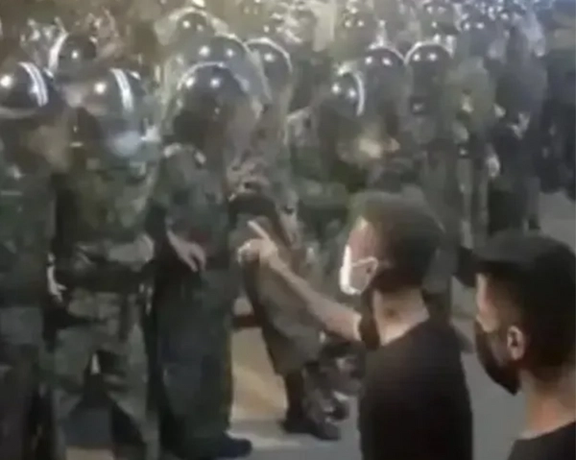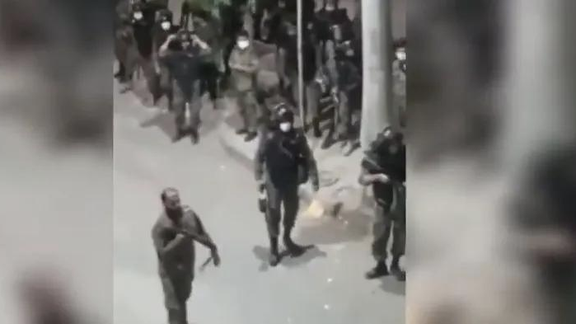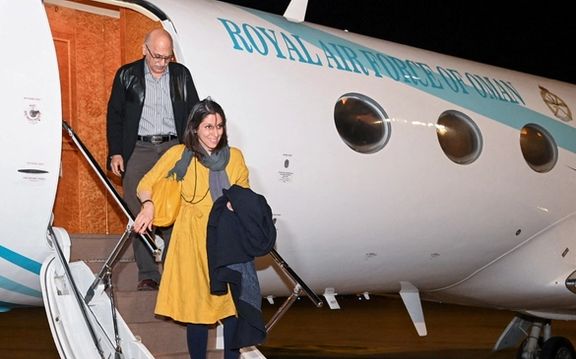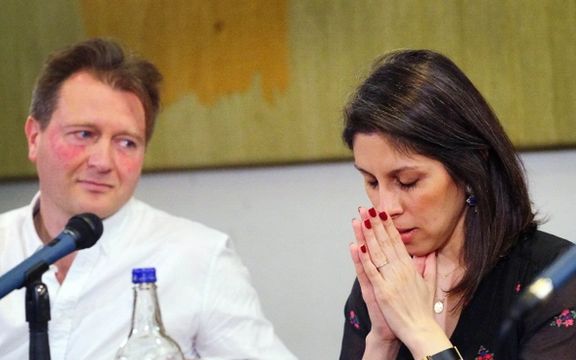Press Rights Group Urges Iran To Stop Arbitrary Detention Of Journos

American independent non-profit organization the Committee to Protect Journalists (CPJ) has urged Iranian authorities to stop “arbitrarily” locking up journalists.

American independent non-profit organization the Committee to Protect Journalists (CPJ) has urged Iranian authorities to stop “arbitrarily” locking up journalists.
“Iranian authorities must understand that they can’t hide the country’s difficult realities and problems by silencing and jailing journalists,” Justin Shilad, CPJ’s Middle East and North Africa senior researcher, said Wednesday in New York.
The international press rights group called for the unconditional release of freelance reporter Arash Ghaleh-Golab, arrested at a mourning ceremony for victims of a collapsed building in the south-western city of Abadan, which killed at least 37 and led to protests in south-west Iran and elsewhere.
The CPJ cited a “source familiar with the case” that when Ghaleh-Golab was arrested “officers hit the journalist with their fists and kicked him.” The group said Ghaleh-Golab was being detained without charge at an undisclosed location and not allowed to contact his family.
The Iranian Writers Association has also expressed concern about Ghaleh-Golab and other detainees of the protests in Abadan and other cities in Khuzestan province. Security measures, including restrictions on the Internet, had made the situation of journalists and other detainees “very worrying,” the association said.

The ranking member of the US Senate Foreign Relations Committee has condemned the cyberattack by Iran-backed hackers on Boston Children’s Hospital last summer.
Describing the attempted attack as “deeply disturbing,” Idaho’s Republican Senator Jim Risch said in a tweet on Wednesday that “it’s typical of a regime that’s synonymous with global terrorism.”
He also expressed gratitude to the FBI and other security agencies that continue “to keep America safe from Iran’s malign activity.”
FBI Director Christopher A. Wray disclosed the news about the “despicable” attack by hackers sponsored by Iran Wednesday, warning of rising threats of cyberattacks sponsored by nation states like Iran, Russia and China to companies and US infrastructure.
“If malicious cyber actors are going to purposefully cause destruction, or hold data and systems for ransom, they tend to hit us somewhere that’s really going to hurt,” Wray added.
Arkansas’ Tom Cotton, another Republican senator, also reacted to the news, urging the Biden administration to hold Tehran accountable and not to reenter an agreement with the Islamic Republic.
“Instead of giving sanctions relief to the world's worst state sponsor of terrorism, Joe Biden should start holding Iran accountable,” Cotton said.
Iran has been repeatedly accused of cyber-attacks against the West, Israel and rival Arab countries in the Middle East.

While pressure is rising on Iranian filmmakers who issued a statement in support of popular protests, urging security forces to exercise restraint, more artists have expressed support for the move.
Iranian filmmaker Mohammad Rasoulof said on Wednesday that over 70 more filmmakers and actors have joined the signatories of the statement – headlined ‘Lay Down Your Arms’.
Veteran director and screenwriter Masoud Kimiai, actress Taraneh Alidoosti, who stars in 'Leila's Brothers' and recently attended the competition for the Palme d'Or at the Cannes Film Festival, Iranian-Canadian producer and actor Mani Haghighi, and actor Masoud Karamati are among the new signatories of the letter.
Earlier in the day, a group of Iranian artists residing abroad also warned security forces to lay down their arms and join the people before facing the "fire of the people's anger." They also called for an end to appeasement of the Islamic Republic as well as its “money laundering and propaganda machine.”
According to Rasoulof on Tuesday, a lot of the artists have been threatened and intimidated by the Islamic Republic's authorities to rescind their signatures.
The Iranian minister of Culture and Islamic Guidance warned Monday night, “We will punish those who seek to stand in the way of IRGC and guardians of Iran’s security by releasing worthless statements and delusional remarks.”
The ongoing protests began when a 10-story building collapsed in Abadan, in the oil-rich Khuzestan province May 23, leaving 37 people dead while dozens are still missing.

Amnesty International said Wednesday that the onus lay with the British government to investigate Iranian officials suspected of “hostage-taking.”
The group released a detailed report compiling evidence that the six-year detention of Nazanin Zaghari-Ratcliffe on spying charges amounted to a crime under international law and cited other foreign and dual nationals detained in Iran “whose arbitrary detention may amount to hostage-taking.” Amnesty said it last month submitted its evidence to the British parliament’s Foreign Affairs Committee, which has set up its own enquiry.
Zaghari-Ratcliffe was released and returned to London in March following the British government paying a £400-million ($500-million) debt to Iran outstanding since the 1970s.
“They used spurious national security charges and sham judicial proceedings against her with the aim of exerting pressure on the UK government to settle its debts,” said Diana Eltahawy, Amnesty’s Deputy Director for the Middle East and North Africa.
Amnesty noted that after Zaghari-Ratcliffe’s release “a slew of reports by Iranian state media outlets” stated “she had been released ‘in exchange’ for the payment.” These media reports “mirrored “almost identical statements made by the Iranian authorities to Nazanin Zaghari-Ratcliffe and her family during her detention.”

But while both Iran and the United Kingdom were parties to International Convention Against the Taking of Hostages, requiring them to both prevent and to punish hostage-taking, Eltahawy argued, the “prevailing climate of impunity in Iran has emboldened the authorities to continue using dual and foreign nationals as political bargaining chips without any fear of consequences.”
Request extradition
“The Convention,” the Amnesty report explains, “defines the crime of hostage-taking as the seizure or detention of any person accompanied with threats to cause them harm including by killing, injuring or continuing to detain them in order to compel a third party, such as a state, to do or abstain from doing any act as an explicit or implicit condition for the release of the hostage.”
Hence, Amnesty further argued, “where sufficient evidence exists” against Iranian officials, “the UK must request their extradition and prosecute the officials in line with international fair trial standards.”
Zaghari-Ratcliffe has been critical of the British handling of her case, including one representative standing by in Tehran as she was required on release to sign a confession. In 2017, then British foreign secretary Boris Johnson told the House of Commons Zaghari-Ratcliffe had been in Iran “simply teaching people journalism” – rather than on holiday.
The Amnesty report also highlighted the cases of Ahmadreza Djalali, a Swedish-Iranian doctor on death row, Austrian-Iranians Kamran Ghaderi and Massud Mossaheb, German-Iranians Nahid Taghavi and Jamshid Sharmahd, and two British-Iranians Mehran Raoof and Morad Tahbaz (the last also a United States national). It noted the death in custody in March of 83-year-old Australian-Iranian national Shokrollah Jebeli “after the authorities deliberately denied him adequate specialized medical care and withheld his medication for his multiple serious health conditions.”

Iranian government hackers last year attempted a "despicable" cyber-attack against Boston Children's Hospital, FBI Director Christopher Wray said on Wednesday.
Wray, in a speech delivered at a conference hosted by Boston College, detailed the incident as he warned about the rising threat cyber-attacks sponsored by nation states like Iran, Russia and China pose to companies and US infrastructure.
“We got a report from one of our intelligence partners indicating Boston Children's was about to be targeted, and understanding the urgency of the situation, the cyber squad in our Boston field office raced out to notify the hospital," Wray said.
Wray said officials with the FBI were able to quickly get the nationally renowned children's hospital the information needed to "stop the danger right away" and mitigate the threat.
"Quick actions by everyone involved, especially at the hospital, protected both the network and the sick kids that depended on it," Wray said.
Wray called the incident "one of the most despicable cyberattacks I have ever seen" and was an example of the increasing risks hospitals and other providers of critical infrastructure face from hackers, including state-sponsored ones. The attack put the lives of patients at risk.
"If malicious cyber actors are going to purposefully cause destruction, or hold data and systems for ransom, they tend to hit us somewhere that's really going to hurt," Wray said.
Iran has been repeatedly accused of cyber-attacks against the West, Israel and rival Arab countries in the Middle East.
Reporting by Reuters

Israel’s military said Wednesday it has held a widescale military maneuver to simulate attacks on Iranian nuclear facilities.
According to a statement by the Israel Defense Forces (IDF), dozens of fighter jets conducted a drill that included "long-range flight, aerial refueling, and striking distant targets" over the Mediterranean Sea on Tuesday night.
In May, The Times of Israel reported that the drill would simulate a large-scale strike against Iran’s nuclear facilities. The exercise is part of the military’s major Chariots of Fire drills, which involves nearly all branches of the IDF, and has been focusing on training for fighting on Israel’s northern borders, including against the Iran-backed group Hezbollah in Lebanon.
IDF Chief of Staff Aviv Kohavi announced last year that he the army had “greatly accelerated” preparations for action against Tehran’s nuclear program, that would include finding ways to strike facilities that are buried deep underground and preparing for an expected retaliation against Israel by Iran and its allies throughout the region
Israeli Foreign Minister Yair Lapid said Monday Iran must understand that it will pay the price for its terrorist activities and threatening Israelis around the globe, in reference to Iranian threats of revenge for the assassination last week of Revolutionary Guard colonel Hassan Sayyad-Khodaei in Tehran.
He was a commander in Iran’s extra-territorial Qods (Quds) Force reportedly in charge of organizing attacks against Israel.